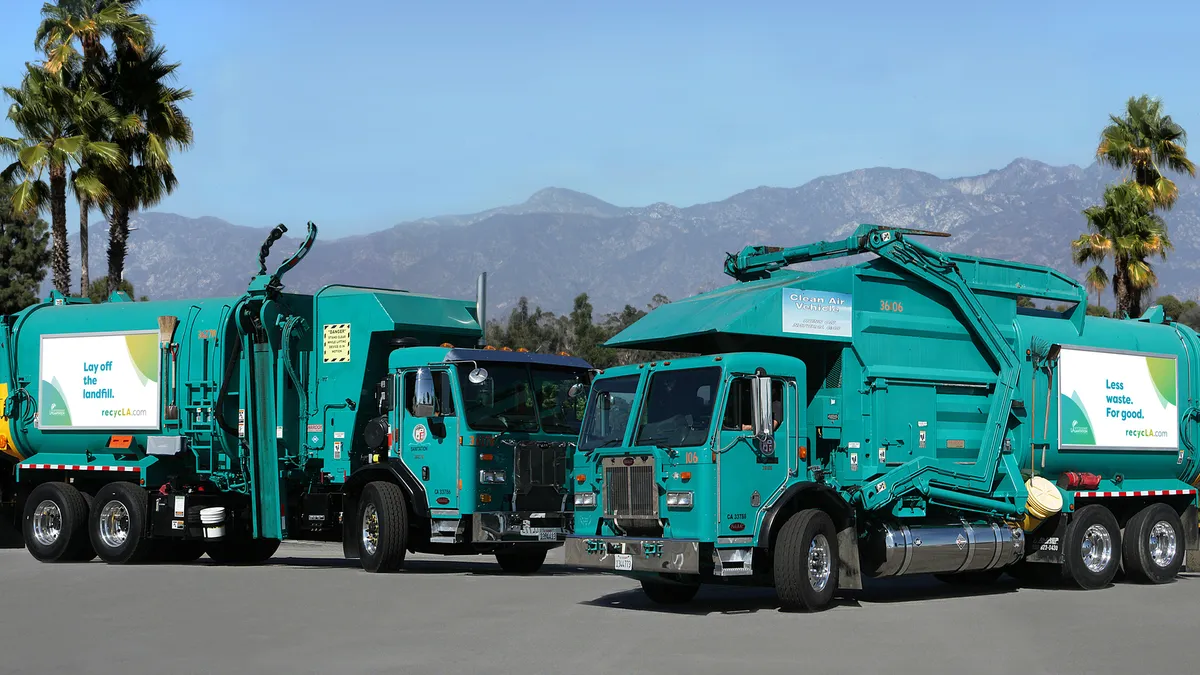UPDATE: Feb. 20, 2019: A settlement agreement between the Los Angeles Bureau of Sanitation (LASAN) and seven RecycLA service providers was adopted Wednesday by the Los Angeles City Council after receiving approval from both the Budget and Finance Committee and the Energy, Climate Change, and Environmental Justice Committee on Tuesday. The agreement was previously approved by the Los Angeles Board of Public Works (BPW) on Feb. 15.
During the Feb. 19 meeting, Councilmember Paul Koretz stated his interest in launching a education-focused Organics Implementation Team in preparation for the roll-out of a "world-class" organics program by 2020. The organics program would provide farmers with a high grade compost option, thus decreasing methane leaks and other pollutants in nearby neighborhoods.
Dive Brief:
- After months of negotiation, the Los Angeles Bureau of Sanitation (LASAN) has reached a settlement agreement with the seven RecycLA service providers. Among multiple changes, it is designed to give them more leeway on meeting contract targets, while reducing near-term costs for customers and reinforcing diversion goals.
- If approved by the Los Angeles Board of Public Works (BPW) on Feb. 15, customers will no longer pay access/distance fees for blue bin recycling. The city will split the expense of any fees, including retroactive charges, at an initial cost of $9.12 million. Contamination levels up to 20% will also be allowable through 2020 in an extended "optimization period."
- Companies now have until Jan. 31, 2023 to meet initial disposal reduction targets and will pay lower liquidated damages if they fail to do so. 2020 rate increases for blue bin and green bin organics service have been raised to 3.5% beyond CPI (plus an automatic 0.25% increase to reflect low commodity values), and an automatic 3% increase for overall cost of service will take effect in 2022.
Dive Insight:
The RecycLA franchise saga has been a long, ambitious and contentious one. Waste Management, Republic Services, Athens Services, Universal Waste Systems, CalMet Services, NASA Services and Ware Disposal have lucrative 10-year contracts (with the option to extend) but have been working overtime to meet elevated standards amid ongoing public scrutiny.
While LASAN notes that initial missed collection issues are old news, the mounting expense of additional fees has become a serious issue. On top of higher baseline costs, the fees have spurred vitriol and pushback from multiple real estate and business interests. Whether or not any of these changes will quiet the program's critics, or have any effect on ongoing legal proceedings, remains unclear.
An estimated 19,600 of the program's 66,000 customers are currently getting extra charges based on access or distance, according to LASAN. The city's initial $9.12 million contribution, along with an equal amount of foregone payments to service providers, is slated to cover any charges incurred Feb. 2018-June 2019. Each party expects to spend $7 million per year moving forward. Budget reserves can cover future expenses through at least FY20. LASAN has committed to spending upward of $94.2 million on this program through 2027 if necessary.
Described as the "Removing Barriers to Recycling" program, these new terms will also require service providers to offer robust and ongoing education, including up to four warnings for customers that surpass the 20% contamination threshold.
Multiple companies told Waste Dive this had been a challenge last fall, but said they were largely holding off on contamination charges out of good faith. Temporarily raising the acceptable threshold from 10% to 20% and agreeing to waive extra charges until 2020 runs counter to the current industry narrative at a national level — but it's a sign of how delicate the customer relationship is right now in this program.
As service providers deal with tough national commodity market trends, elevated organics diversion requirements and future infrastructure expenses, it's clear some may have underestimated their initial bids. Even though the timing has been delayed, the newly agreed-upon rate increase schedule can be expected to help fill that gap. At the same time, they still need engaged customer participation to start making headway on mandated disposal reduction targets, so perceptions of excessive rate increases could create future tensions.
Los Angeles still has a stated goal of 90% landfill diversion by 2025, but the city has revised its RecycLA contract target from 45% to 35% diversion by 2023. A lack of recent data (another RecycLA priority) makes it hard to assess where that diversion rate currently stands. Regardless of this new financial compromise, it's clear significant progress will need to be made by all parties in order to hit the mark.
This story has been updated to specify the nature of cost-sharing between Los Angeles and the RecycLA service providers.
















